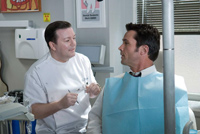Some of my favorite experiences at the movies have come as a result of stumbling across something wholly unexpected. Movies that catch us by surprise often crystallize into some of our most cherished cinematic experiences. We usually know, more or less, if the movie we’re about to see will delight or disappoint. Usually it’s just a matter of discovering the degree. But with the new fantasy comedy Ghost Town, the word I keep hearing on everyone’s lips, critics and moviegoers alike, is “surprise.” And indeed it is the best possible kind of surprise—a film at once hilarious and heartfelt.
We are predisposed to dislike the misanthropic Bertram Pincus (Ricky Gervais). After all, he’s a dentist. Pincus’ favorite time of the day is when he inserts his barbaric tools into his patients’ mouths to stop their incessant talking. Pincus is rude and profoundly anti-social. It’s not that he hates crowds, he says, just the people in them. So when a near-death experience during a routine hospital procedure allows him to see dead people, Pincus is suddenly overwhelmed with attention. It turns out Manhattan is overrun with ghosts (more ghosts than the living, it seems) seeking to remedy the unfinished business of their lives before they can slip away into the afterlife. And they see Pincus as their liaison to the living world.

Some spirits are more persistent than others. Enter Frank (Greg Kinnear), a philandering jerk who tells Pincus he has to break up the impending marriage between his widow Gwen (Téa Leoni), an Egyptologist who, ironically enough, works with the dead, and her new beau Richard (Billy Campbell), a third-world humanitarian lawyer. Do this, Frank says, and he and the thousands of other pleading poltergeists haunting Pincus’ life will disappear forever. Reluctantly, Scrooge, er, Pincus agrees.
We know how this will end, of course. Pincus, the rotund curmudgeon, falls head over heels for the vivacious Gwen, who, coincidentally, lives in his building. It turns out Pincus has had his own fair share of heartbreak, and has isolated himself from the world in an effort to keep himself from being hurt again. But the more time Pincus spends with Gwen, the more he finds himself coming out of his shell and feeling human again.
Ghost Town isn’t breaking any new ground. We’ve been here before, from Ghost to the more recent Over Her Dead Body. Fortunately, the time-honored formula is just dry and sardonic enough to feel reasonably fresh again. The uproarious Gervais surely deserves the lion’s share of the credit.

Ghost Town may finally make Gervais a household name in America. The beloved star of the British The Office and Extras (not to mention an uproarious set of podcasts) certainly has a cult following in the U.S., but is still largely undiscovered. That tragedy may finally be rectified. Like Robin Williams in Aladdin, Gervais gives one the impression that Ghost Town director David Koepp took back the script, told his star roughly what the scene was about, and then let him go.
The movie is chock full of the sort of comedy only Gervais can do—caustic and sarcastic but always shot through with the light, bouncy quality of a court jester who is laughing with you every bit as much as he’s laughing at you. What is, perhaps, most surprising is that Gervias, in his first leading role, is so likable and commanding. Gervais’ eccentric sensibilities, perfect comic timing, and unpredictably compelling presence dominate the screen. As with most of the sad sack losers he plays, Gervais is lovable even when he’s being despicable.
It doesn’t hurt that Gervais is surrounded by terrific co-stars. If there is a more likable actor in Hollywood than Greg Kinnear, I don’t know him. Téa Leoni, widely regarded as a gifted screwball comedienne whose elegance, intelligence and wit has never been fully appreciated, is an unmitigated delight. And SNL‘s Kristen Wiig is deadpan delightful.

Director David Knoepp, known more for the things he has written (Steven Spielberg’s Indiana Jones and the Kingdom of the Crystal Skull, War of the Worlds and Jurassic Park) than the things he has directed (Stir of Echoes), helms his first comedy with a deft, confident hand. There’s frivolous comedy and then there’s light, enjoyable diversions. Ghost Town is certainly the latter, a whimsical romantic fable and endearing date movie for adults.
Beneath the charming, old-fashioned, Capra-esque humor, Ghost Town has some rather important things to say. And it says them without the usual sort of preachy, heavy-handed morality one usually gets in fables of this nature.
Despite being a comedy, Ghost Town knows when (and how) to take itself seriously. One cannot escape the film’s mournful implications. After all, many of the characters in the film died tragically, as Shakespeare said:
“Cut off even in the blossoms of my sin,
Unhousel’d, disappointed, unanel’d,
No reckoning made, but sent to my account
With all my imperfections on my head:
O, horrible! O, horrible! most horrible!”

Ghost Town does not make light of Frank’s infidelity. It is not the punch line for a joke as it might have been in other films. Pincus clearly thinks very little of the philandering phantom. The emotional damage caused by the betrayal of Frank’s marital vows manifests itself in Gwen. Frank thinks the affair he engaged in while living went unnoticed by his wife. But he was wrong. Ghost Town handles this potentially dark and unsettling revelation with genuine delicacy and pathos.
At one point, Pincus describes his failed love life to Gwen as boring and ordinary. But Gwen gently chastises him, telling him that all our individual stories are important. Sure, they may not be dramatic or larger than life when compared to some other people, but they are ours and as such, are profoundly important.
But without a doubt the overriding message of the film is the one that takes place in the life of an anti-social man desperately out of touch with his own humanity. As he is immersed in the cares and concerns of the ghosts who haunt him—cares and concerns largely for those they left behind rather than their own selfish desires—Pincus learns, from the dead, how to live again. What does being a jerk get you, Ghost Town asks. Only those things done for truly last. The final lines of the film are simply lovely.
Funny and heartwarming, this love letter to New York City’s Upper East Side is refreshingly free of flashy special effects and paranormal gags. It is a film about relationships—the comical and the pitiful. And how those relationships echo through eternity long after we are gone.
Talk About It
Discussion starters- The film’s message is that a life lived for self is pointless. Do you agree that the only satisfaction we’ll find in life is living for others? What Scripture verses reflect this?
- Do you ever feel that your life’s story is boring and ordinary? What do you see, however, when looking at it through God’s eyes?
- Long after Frank has died, the repercussions of his sins ripple through the lives of those he touched. Do you believe your actions have eternal consequences?
The Family Corner
For parents to considerGhost Town is rated PG-13 for some strong language, sexual humor and drug references. The language is infrequent, but prickly when it appears. Although there are no overtly sexual situations, there are discussions about the sexual organs of a mummified Egyptian ruler. The aforementioned drug references relate to prescription medication, not illegal narcotics (though the person seeking them wants them for decidedly other than authorized purposes).
Photos © Copyright Dreamworks/Paramount
Copyright © 2008 Christianity Today. Click for reprint information.












